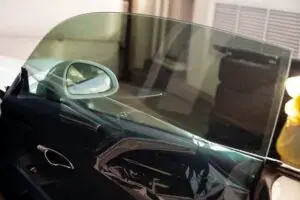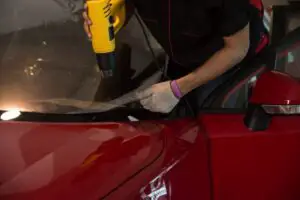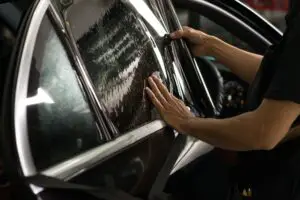Tennessee enacted its window tinting laws back in 1990 and has made sure to keep them updated as time has moved forward, so it can be hard for many people to actively keep up with the state’s laws.
Tennessee window tint laws have set a 35% VLT requirement for most windows on the car, while the windshield has even stricter limitations in place, forcing people to apply 70% VLT on the windshield.
Make sure to read this article in its entirety, as I will go over all the rules and regulations that the state has set for tinting windows and answer any questions or concerns you may have regarding window tints or their laws in Tennessee.
Table of Contents
- 1 How Much Tint Darkness Is Legal In Tennessee?
- 2 Window Tint Reflection And Tint Colors
- 3 Medical Exemption Of Window Tint Laws In Tennessee
- 4 Get A Certified Sticker From The Company
- 5 Other Window Tint Law Rules And Regulations In Tennessee
- 6 Cost Of Car Window Tint In Tennessee
- 7 Frequently Asked Questions
- 8 Conclusion
How Much Tint Darkness Is Legal In Tennessee?

The windshield has been given very harsh restrictions, which are evidence that you need to maintain at least 70% VLT for it.
The rest of the windows have a tint darkness limit of 35%. This is for all vehicles that you can think of.
Tint Darkness Limit For SUVs And Vans
Starting with sports utility vehicles and vans, the first thing I will have to raise again is the limited windshield rules that force people to apply tints that cannot fall below 70% VLT.
If you want a darker tint on the windshield, you can, but it has to be above the AS 1 line that the manufacturer has set.
When you reach the front seat side windows, things get a lot easier as they only have a 35% VLT requirement.
This remains consistent for the rest of the windows too, starting with the back seat side windows, which have a 35% VLT requirement, the same as the rear window.
So aside from the windshield, you can only apply 35% tints to the windows.
Tint Darkness Limit For Sedans
Since I have discussed sports utility vehicles and vans, it is only fair that I discuss sedans. Here is how the rules look for the average Sedan in Tennessee.
1. Front Windshield
The front windshield has a bit more complexity when it comes to these rules, as you can apply any tint you want, but only if it is above the AS 1 line of the windshield.
The rest of the tint must allow at least 70% of light to come into the car.
2. Front Seat Side Windows
The front-seat side windows have the standard VLT requirement of 35%. This means that you must allow at least 35% of outside light to enter the car.
Otherwise, you will be breaking the law.
3. Rear Window
Things are dialed back when you get to the rear windows, which are back to the 35% VLT requirement.
4. Back Seat Side Windows
This is retained for the back seat side windows, which also must allow at least 35% of the light to enter the vehicle.
Window Tint Reflection And Tint Colors
- Tennessee has set very basic rules when it comes to the reflectiveness and the color of the tints that you can apply to your windows.
- The front-seat side windows of all cars and vehicles cannot have any mirrored or metallic appearances at all.
- This is the same case for the back seat side windows, which can only use non mirrored or nonmetallic tints.
- Tennessee has not restricted any colors from being used as window tints.
- This means that you can use whatever tint color you like.
Medical Exemption Of Window Tint Laws In Tennessee

Around Tennessee, various people suffer from illnesses and conditions that may cause them pain or discomfort when they enter the sun’s light.
This may pose a problem for them when driving, so they tend to resort to using darker tints that may or may not be legal in their state.
To provide some relief and convenience to these people, Tennessee offers medical exemptions to these people.
For this, you must get a signed waiver that includes a statement from your doctor or physician explicitly telling why you need special tints.
You can also submit the statement to the commissioner. This will allow you to use darker, special tints that will shield you from the sun’s UV rays.
Get A Certified Sticker From The Company
Tennessee requires that you have a certification sticker on your car window. You must have a certification sticker between the film and the front seat side window of the driver.
This sticker is critical for law enforcement in identifying that you are using state-legal tints.
This applies to people who are medically exempt as well as they will get a special sticker that they must apply.
Unlike the people who use the tints, the manufacturers of the tints are not required to certify that the tints they are making are up to the standards set by the state.
Other Window Tint Law Rules And Regulations In Tennessee
If you thought that the laws were over, then get ready as here, I will discuss other rules and regulations that the state has fixed regarding tinting your car windows.
- There are no rules in side mirrors when it comes to tinting.
- The state of Tennessee does not offer any amount of tint variance.
- You must have a certification sticker between the driver’s front-seat side window and the tint itself.
- Medical exemptions are allowed by the state, and you must have a special sticker between the driver’s front-seat side window and the tint film.
Cost Of Car Window Tint In Tennessee
Basic, low-quality tints can start from $150. Prices will only go up if you decide to get better quality tints. Tints like ceramic window tints can cost up to $400 per vehicle.
These costs are just rough estimations for the most part, as there are a lot of different factors when it comes to tinting your windows, and there is no certainty that the place you are getting your tint from will charge the same as another.
Frequently Asked Questions
Q1. Is 15% Tint Legal In Tennessee?
15% tint is completely illegal in Tennessee unless you are proven to be medically exempt and have gone through the proper channels to establish that you are medically exempt from the laws established by the state.
Q2. Are 5% Tints Legal In Tennessee?
Since the state only allows 35% VLT window tints, it is obvious that using 5% tints will be illegal in all regards in Tennessee.
They can only be allowed if you have proved that you are medically exempt from the set laws of the state.
Q3. Is Limo Tint Legal In Tennessee?
Considering that limo tints are very dark unless you are medically exempt, limo tints are not legal for use in Tennessee, so you should avoid them at all costs and use tints that allow at least 35% of outside light to come into the car.
Q4. Can I Get Pulled Over For Tint In Tennessee?
If your car is seen on the road by a police officer and they notice that your tints are darker than usual or do not have a certification sticker, they reserve the right to pull you over and check to make sure everything is in order or give you a ticket.
Q5. How Much Is A Tint Ticket In Tennessee?
If you are pulled over and given a tint ticket, you will most likely have to face a fine that starts from $130, and this fine can easily go over $300 if the matter is taken to court.
Conclusion
Tennessee tint laws are very strict on what they demand from the people.
That being said, they are straightforward to understand as well, and with the help of this article, you should know everything when it comes to window tinting laws.
For example the laws on medical exemptions which do exist in this state along with the requirements of VLT and certification stickers.
Make sure that you abide by these laws as it will save you a lot of trouble with the police and prevent major fines and trips to the court in the long run.

I am Tahir Azam, and I have been writing amazing articles for TaxiHack for as long as I can remember. I know everything that is to know when it comes to automobiles and is always on top of industry news and developments. While I am not an expert by any means, I pride myself on knowing the ins and outs of many different problems and, of course, their solutions. The articles on our website are some of the best and well-researched content that you will find, and I spend countless hours making sure this remains to be true. This is why I ask you to take your time out and read some of my articles, especially if you find a topic that resonates with you or is something you are looking into. This way, you will find the perfect mix of information and tips on your desired topic. Learn more about Tahir.



